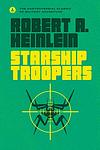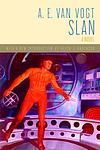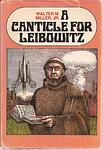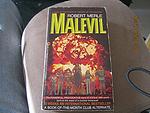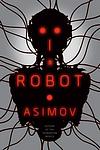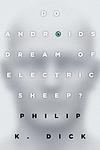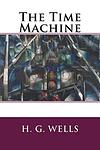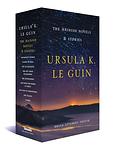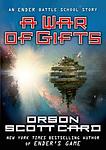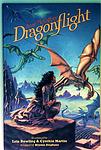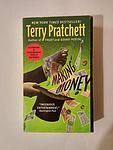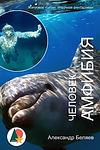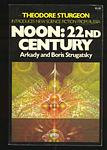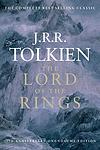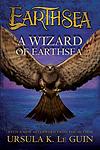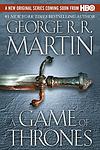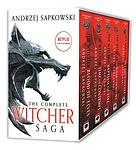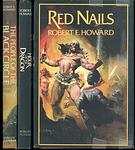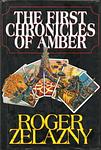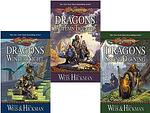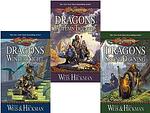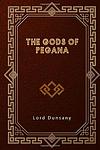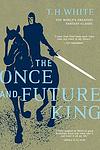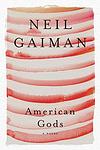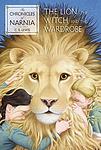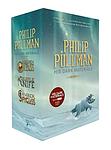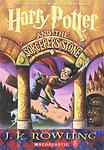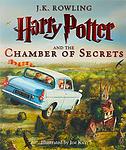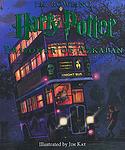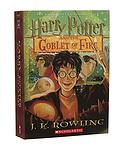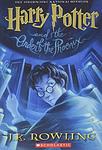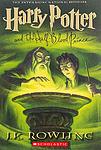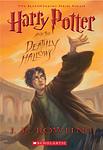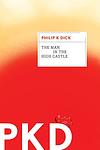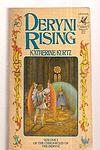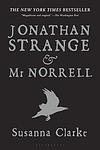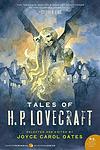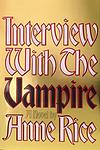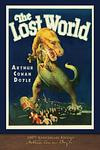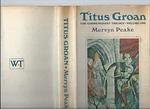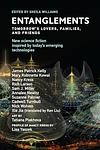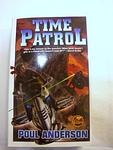100 Main Fantasy and Science-Fiction Books
This is one of the 284 lists we use to generate our main The Greatest Books list.
-
Gulliver's Travels by Jonathan Swift
This classic satire follows the travels of a surgeon and sea captain who embarks on a series of extraordinary voyages. The protagonist first finds himself shipwrecked on an island inhabited by tiny people, later discovers a land of giants, then encounters a society of intelligent horses, and finally lands on a floating island of scientists. Through these bizarre adventures, the novel explores themes of human nature, morality, and society, offering a scathing critique of European culture and the human condition.
-
Frankenstein by Mary Shelley
This classic novel tells the story of a young scientist who creates a grotesque but sentient creature in an unorthodox scientific experiment. The scientist, horrified by his creation, abandons it, leading the creature to seek revenge. The novel explores themes of ambition, responsibility, guilt, and the potential consequences of playing God.
-
Alice's Adventures in Wonderland by Lewis Carroll
This novel follows the story of a young girl named Alice who falls down a rabbit hole into a fantastical world full of peculiar creatures and bizarre experiences. As she navigates through this strange land, she encounters a series of nonsensical events, including a tea party with a Mad Hatter, a pool of tears, and a trial over stolen tarts. The book is renowned for its playful use of language, logic, and its exploration of the boundaries of reality.
-
Twenty Thousand Leagues Under the Sea by Jules Verne
This classic science fiction novel follows the adventures of Professor Aronnax, his servant Conseil, and harpooner Ned Land as they are captured by the enigmatic Captain Nemo aboard the Nautilus, a technologically advanced submarine. As they journey 20,000 leagues under the sea, they encounter a variety of sea creatures and underwater phenomena. The narrative explores themes of exploration, scientific discovery, and man's relationship with nature.
-
The Strange Case of Dr. Jekyll and Mr. Hyde by Robert Louis Stevenson
This classic novel explores the duality of human nature through the story of a respected London doctor who creates a potion that transforms him into a sinister, violent alter ego. As the doctor increasingly loses control over when the transformations occur, his alter ego's evil deeds escalate, causing havoc in the community. The narrative is a chilling exploration of humanity's capacity for evil and the struggle for individuals to reconcile their public personas with their private desires.
-
A Connecticut Yankee In King Arthur's Court by Mark Twain
The novel follows the fantastical journey of a 19th-century American engineer who, after a blow to the head, finds himself transported back in time to the medieval kingdom of King Arthur. Using his modern knowledge and ingenuity, the protagonist attempts to modernize the past society, introducing industrial technology and democratic ideas. His efforts to revolutionize the Arthurian world are met with both humor and a critical examination of the social and political issues of both the past and his contemporary society, ultimately leading to a complex interplay between progress and tradition.
-
Dracula by Bram Stoker
This classic horror novel tells the story of Count Dracula's attempt to move from Transylvania to England so that he may find new blood and spread the undead curse, and of the battle between Dracula and a small group of people led by Professor Abraham Van Helsing. The narrative is composed of journal entries, letters, and telegrams written by the novel's protagonists, providing different perspectives on the gruesome events unfolding. The book touches on themes of sexuality, gender roles, and the clash of modern science with traditional superstition.
-
War of the Worlds by H. G. Wells
This classic science fiction novel tells the story of a Martian invasion of Earth, as experienced by an unnamed protagonist and his brother. The Martians, who are technologically far superior to humans, cause widespread devastation with their heat-ray weapons and towering tripods. Despite humanity's best efforts to resist, they seem unstoppable. The novel is a commentary on British imperialism and explores themes of human survival and evolution.
-
Prelude To Foundation by Isaac Asimov
In this science fiction novel, a young mathematician arrives at the galactic empire's capital planet, hoping to present his revolutionary theory of psychohistory—a mathematical framework capable of predicting the future of large populations. While his ideas are initially met with skepticism, they soon attract the attention of the empire's political figures, who see potential for both control and upheaval. As the protagonist navigates the complex political landscape, he is pursued by various factions seeking to use his theory for their own ends. Along the way, he explores different cultures and subcultures of the sprawling empire, all while attempting to refine his nascent theory and understand the true implications of his work for the future of humanity.
-
Starship Troopers by Robert A. Heinlein
The book is a military science fiction novel set in the future, where humanity is engaged in an interstellar war against an alien species known as the Arachnids or "Bugs." It follows the story of Juan "Johnny" Rico, a young infantryman in the Mobile Infantry, a futuristic military unit equipped with powered armor suits. The narrative delves into Rico's experiences and growth from a naïve recruit to a seasoned officer, exploring themes of citizenship, duty, and the moral complexities of war. Through Rico's eyes, the novel examines the structure of a militaristic society where full citizenship and the right to vote are earned through military service, presenting a society that values sacrifice and responsibility in a perpetual struggle for survival against a hostile universe.
-
Slan by A. E. van Vogt
The book is a science fiction tale set in a future where humanity is at odds with a genetically advanced subspecies known as Slans, who possess telepathic abilities and are persecuted by the fearful human majority. The story follows a young Slan named Jommy Cross as he navigates a world filled with danger and discrimination, seeking to uncover the truth about his kind and find a place where Slans can live in peace. His journey is fraught with challenges, including evading the relentless human forces bent on eradicating his species, while also contending with internal divisions among the Slans themselves. The narrative explores themes of prejudice, survival, and the quest for understanding between different beings.
-
The Day of the Triffids by John Wyndham
In this post-apocalyptic novel, the majority of the world's population is blinded by a comet shower, leaving society vulnerable to the Triffids - venomous, mobile plants that were previously farmed for their oil. The protagonist, who retains his sight after being hospitalized during the comet shower, must navigate this new world, dealing with the Triffids and the desperate remnants of humanity. The novel explores themes of survival, adaptation, and the inherent fragility of civilization.
-
A Canticle for Leibowitz by Walter M. Miller
"A Canticle for Leibowitz" is a post-apocalyptic science fiction novel that explores the cyclical nature of history through the lens of a Catholic monastery in the American Southwest. After a devastating nuclear war, the monks of the Albertian Order of Leibowitz work to preserve the remnants of mankind's scientific knowledge until the world is again ready for it. Over the course of centuries, civilization rises and falls, wars are fought, and scientific advancements are rediscovered and then lost again. The novel is a poignant commentary on the potential for humanity to repeat its mistakes.
-
Malevil by Robert Merle
Set in the aftermath of a devastating nuclear war, the novel follows a group of survivors who find refuge in a medieval castle named Malevil. The survivors, led by the protagonist, must navigate the challenges of rebuilding their lives in a drastically altered world. They grapple with issues of survival, community, morality, and leadership as they encounter other groups of survivors with different philosophies and intentions. The story is a gripping exploration of human resilience, the will to maintain civilization, and the complexities of interpersonal relationships in a post-apocalyptic setting.
-
I, Robot by Isaac Asimov
The book is a collection of nine short stories that revolve around the interaction of humans and robots. The stories are tied together by a framing narrative featuring a reporter interviewing a retiring robopsychologist, Dr. Susan Calvin. The stories explore the three "Laws of Robotics" and how they are interpreted and manipulated by humans and robots. Throughout the stories, the robots often end up behaving in unexpected ways due to their interpretation of these laws, leading to thought-provoking and often ironic outcomes.
-
Do Androids Dream of Electric Sheep? by Philip K. Dick
Set in a post-apocalyptic world, the novel presents a future where Earth's life has been greatly damaged by a nuclear global war, leaving most species extinct. The remaining human population has been encouraged to emigrate to off-world colonies to preserve the human race. Those who remain on Earth are tasked with maintaining the ecological balance by owning and caring for animals, replacing extinct species with mechanical replicas when necessary. The story revolves around a bounty hunter, who is tasked with "retiring" rogue androids that pose a threat to humans, and his emotional and moral struggles as he goes about his work.
-
Neuromancer by William Gibson
In this groundbreaking cyberpunk novel, a washed-up computer hacker is hired by a mysterious employer to pull off the ultimate hack. As he navigates a dystopian future filled with artificial intelligence, corporate espionage, and virtual reality, he must confront his own past and the dark realities of the digital world. The narrative explores themes of technology, identity, and consciousness, pushing the boundaries of science fiction literature.
-
2001: A Space Odyssey by Arthur C. Clarke
This science fiction novel follows a voyage to Jupiter with the sentient computer HAL after the discovery of a mysterious black monolith affecting human evolution. Dealing with themes of existentialism, human evolution, technology, artificial intelligence and extraterrestrial life, it is a journey of discovery that takes a dangerous turn when the onboard computer begins to malfunction. The story is a complex mix of science, philosophy, and conjecture.
-
Jurassic Park by Michael Crichton
A billionaire entrepreneur, with the help of genetic scientists, creates a wildlife park on a secluded island filled with genetically engineered dinosaurs. When a small group of experts are invited to the park for a preview, things go awry as the security systems fail and the dinosaurs break free. The group must survive and escape the island while dealing with the dangerous prehistoric creatures and the moral implications of tampering with nature.
-
The Time Machine by H. G. Wells
A Victorian-era scientist invents a machine that allows him to travel through time. He first journeys to the year 802,701 A.D., where he encounters the Eloi, a society of small, elegant, childlike adults who live in harmony but lack curiosity and drive. He later discovers the Morlocks, a nocturnal, subterranean species who prey on the Eloi. After rescuing an Eloi named Weena, the protagonist loses his time machine and must devise a plan to recover it and return to his own time, all while exploring the social and evolutionary implications of the two distinct societies.
-
We by Yevgeny Zamyatin
In this dystopian novel, the story is set in the future, where the protagonist, a mathematician, lives in a highly regulated society where citizens are known by numbers, not names, and every action is dictated by the state. Individuality and freedom are suppressed, and even the concept of love is replaced by regulated sexual liaisons. The mathematician begins to question the infallibility of the state after meeting a rebellious woman, leading to a series of events that challenge the very foundations of his world.
-
Brave New World by Aldous Huxley
Set in a dystopian future, the novel explores a society where human beings are genetically bred and pharmaceutically conditioned to serve in a ruling order. The society is divided into five castes, each with its specific roles. The narrative follows a savage who rejects the norms of this new world order and struggles to navigate the clash between the values of his upbringing and the reality of this technologically advanced, emotionless society. His resistance prompts a deep examination of the nature of freedom, individuality, and happiness.
-
Nineteen Eighty Four by George Orwell
Set in a dystopian future, the novel presents a society under the total control of a totalitarian regime, led by the omnipresent Big Brother. The protagonist, a low-ranking member of 'the Party', begins to question the regime and falls in love with a woman, an act of rebellion in a world where independent thought, dissent, and love are prohibited. The novel explores themes of surveillance, censorship, and the manipulation of truth.
-
Fahrenheit 451 by Ray Bradbury
In a dystopian future where books are banned and burned by the government to prevent dissenting ideas, a fireman named Guy Montag, whose job is to burn books, begins to question the society he serves. After a series of events, including meeting a free-thinking teenager and witnessing a woman choosing to die with her books, Montag begins to secretly collect and read books, leading to his eventual rebellion against the oppressive regime. The narrative serves as a critique of censorship, conformity, and the dangers of an illiterate society.
-
Slaughterhouse-Five by Kurt Vonnegut
The novel follows the life of Billy Pilgrim, a World War II veteran who has become "unstuck in time," experiencing his life events out of order. This includes his experiences as a prisoner of war in Dresden during the Allies' firebombing, his post-war life as a successful optometrist, his abduction by aliens from the planet Tralfamadore, and his eventual death. The book is a critique of war and a demonstration of the destructive nature of time, with a nonlinear narrative that reflects the chaos and unpredictability of life.
-
Stranger in a Strange Land by Robert A. Heinlein
The novel follows the life of Valentine Michael Smith, a human who was raised on Mars and returns to Earth in early adulthood. Smith struggles to understand human culture, norms, and conventions, while also possessing extraordinary psychic abilities. As he navigates Earth society, he begins to question many of its institutions and values, ultimately creating his own religion to pass on the wisdom he gained on Mars. The book explores themes of freedom, self-reliance, and the nature of humanity, and is considered a classic of science fiction literature.
-
Solaris by Stanislaw Lem
The novel is a psychological exploration of human limitations and failures set against the backdrop of space exploration. When a psychologist arrives at a research station orbiting a distant planet covered entirely by a sentient ocean, he discovers the crew in disarray, haunted by physical manifestations of their subconscious fears and desires. As he grapples with the ocean's inscrutable nature and its unsettling ability to materialize human thoughts, he is forced to confront his own guilt and regret, embodied by the apparition of his deceased wife. The story is a philosophical meditation on the impossibility of truly understanding alien intelligence and the painful isolation of the human condition.
-
The Martian Chronicles by Ray Bradbury
This science fiction novel is a collection of intertwined short stories that depict the colonization of Mars by humans fleeing from a troubled Earth, and the conflict between aboriginal Martians and the new colonists. The book delves into issues such as nuclear war, racism, and censorship. As the human settlers arrive and begin to shape the Martian landscape to their needs, they face a series of strange and haunting encounters with the Martian civilization, leading to unexpected and often tragic outcomes.
-
The Hainish Novels And Stories by Ursula K. Le Guin
This collection brings together the seminal works set in the Hainish Universe, a speculative fiction series that explores complex themes of sociology, anthropology, and psychology within a richly imagined interstellar setting. Through a variety of planets and cultures, the series delves into the intricacies of human nature, the concept of gender, and the consequences of technological and social evolution. The narratives, while diverse in their storytelling, are unified by their exploration of the potential paths of human development and the interconnectedness of all life across the cosmos, challenging readers to reconsider their perspectives on society, identity, and the environment.
-
Ender's War by Orson Scott Card
This science fiction novel follows a young prodigy named Ender Wiggin, who is recruited into an advanced military academy in space to prepare for an impending alien invasion. In a future where Earth has barely survived two conflicts with the Formics, an insectoid alien species, Ender is trained through increasingly difficult war games in zero gravity to develop tactics and leadership skills. As he progresses, Ender struggles with the isolation, manipulation by the military leaders, and the moral implications of his actions in simulations that become disturbingly realistic. The novel explores themes of leadership, the ethics of war, and what it means to truly understand one's enemy.
-
Бездна голодных глаз by H. L. Oldie
This novel unfolds in a fantastical universe where the essence of every living being is determined by their eyes, the windows to the soul, which harbor unique powers and secrets. The narrative follows the journey of a young protagonist who, born with the rarest eyes, embarks on a perilous quest to uncover the truth behind his extraordinary vision. Along the way, he encounters a myriad of characters, each with their own unique eyes and abilities, who either aid or obstruct his quest. Set against a backdrop of intricate politics, ancient prophecies, and a society where the hierarchy is determined by one's gaze, the story delves into themes of power, identity, and the quest for understanding in a world where seeing truly is believing.
-
A Princess Of Mars by Edgar Rice Burroughs
In this science fiction novel, a Confederate soldier named John Carter mysteriously finds himself transported to Mars, known as Barsoom by its inhabitants. On this alien planet, Carter discovers a dying civilization and becomes embroiled in a complex web of political intrigue, epic battles, and forbidden love. With his newfound strength and agility due to the planet's lower gravity, Carter becomes a formidable warrior and fights to protect the princess he loves and the people of Barsoom from imminent destruction.
-
The Skylark Of Space by Edward Elmer Smith
This pioneering work of science fiction tells the story of two brilliant scientists who develop a revolutionary form of propulsion, allowing them to travel through space at unprecedented speeds. Along with a small group of adventurers, they embark on a journey aboard the spacecraft Skylark, exploring distant planets and encountering various alien species. Their voyage becomes a race against time and a hostile alien race, leading to battles that test the limits of their ingenuity and courage. As they navigate these challenges, the crew of the Skylark must also contend with the moral implications of their discoveries and the impact of their journey on the universe at large.
-
Dune by Frank Herbert
Set in a distant future, the novel follows Paul Atreides, whose family assumes control of the desert planet Arrakis. As the only producer of a highly valuable resource, jurisdiction over Arrakis is contested among competing noble families. After Paul and his family are betrayed, the story explores themes of politics, religion, and man’s relationship to nature, as Paul leads a rebellion to restore his family's reign.
-
Dragonflight by Anne McCaffrey
In a world where telepathic dragons and their riders protect the land from the destructive Thread that rains down from the sky, a young woman unexpectedly becomes the new Weyrwoman, bonding with the last queen dragon. As the traditional ways of the past clash with the urgent need to defend their world, she and her enigmatic dragonrider ally must rediscover ancient secrets and take to the skies in a perilous quest to unite the dragonriders and save their planet from annihilation. Their journey is fraught with challenges, both political and personal, as they strive to harness the full power of the dragons and ensure the survival of their way of life.
-
Chanur's Venture by C. J. Cherryh
In this thrilling sequel set in a richly detailed universe, the story follows the captain of a merchant spaceship and her crew as they navigate the complexities of interstellar politics and trade. After rescuing a mysterious alien from another species, they find themselves in the midst of a dangerous political game. With the balance of power at stake, the crew must outwit various alien species with conflicting interests, all while ensuring the safety of their unexpected guest. The novel combines elements of adventure, diplomacy, and intrigue, showcasing the challenges of communication and understanding in a vast, multicultural galaxy.
-
The Vor Game by Lois McMaster Bujold
In this science fiction novel, a young military officer graduates from the academy and is assigned to a remote arctic base, where his leadership skills are quickly put to the test. After navigating the complexities of his first command, he becomes embroiled in a dangerous interstellar mission involving a runaway prince, a space mercenary fleet, and a mysterious space station. As he maneuvers through political intrigue and military strategy, he must use his wits and resourcefulness to prevent an escalating conflict that threatens the balance of power in the galaxy.
-
Hyperion by Dan Simmons
The book is a science fiction narrative that weaves together the tales of seven pilgrims as they journey to the distant world of Hyperion on the eve of interstellar war. Each pilgrim has their own reason for undertaking this pilgrimage to the Shrike, a mysterious and feared creature that resides in the Time Tombs, which are moving backwards through time. As they travel, they share their stories, revealing personal quests, humanity's complex relationship with technology, and the overarching mystery of the Shrike and Hyperion itself. The novel combines elements of space opera with a frame story structure reminiscent of "The Canterbury Tales," exploring themes of love, religion, politics, and art, all set against the backdrop of an impending catastrophe.
-
War with the Newts by Karel Čapek
The novel is a satirical science fiction tale that explores the discovery of a species of intelligent giant newts. When humans realise they can exploit these creatures for economic gain, they are enslaved and used for labor and military purposes. The newts ultimately rebel, leading to a global war. The book serves as a critique of various political, economic and ideological systems, including colonialism, capitalism and fascism.
-
Collected Short Fiction Of Robert Sheckley by Robert Sheckley
This anthology showcases the imaginative and satirical short stories of a pioneering figure in the science fiction genre. The collection spans the breadth of the author's career, offering readers a diverse range of narratives that often blend speculative fiction with dark humor. Through his concise and engaging tales, the author explores themes of human nature, societal norms, and the absurdity of the human condition, all while pushing the boundaries of reality. His work not only entertains but also provokes thought, making this compilation a testament to his enduring influence on science fiction and his ability to captivate readers with his wit, insight, and creativity.
-
A Spell For Chameleon by Piers Anthony
In this fantasy novel, we follow the adventures of Bink, a young man from the magical land of Xanth, who lacks his own magic in a realm where magic is the norm. Facing exile for his deficiency, Bink embarks on a quest to discover his true magical talent. Along the way, he encounters a variety of creatures, challenges, and a mysterious woman named Chameleon, whose beauty and intelligence shift with the phases of the moon. Bink's journey reveals not only the secret of his own latent magic but also addresses themes of self-discovery, the value of nonconformity, and the nature of love and loyalty in a world where everything and everyone is more than they seem.
-
The Hitchhiker's Guide to the Galaxy by Douglas Adams
This comedic science fiction novel follows the intergalactic adventures of an unwitting human, Arthur Dent, who is rescued just before Earth's destruction by his friend Ford Prefect, a researcher for a galactic travel guide. Together, they hitch a ride on a stolen spaceship, encountering a range of bizarre characters, including a depressed robot and a two-headed ex-president of the galaxy. Through a series of satirical and absurd escapades, the book explores themes of existentialism, bureaucracy, and the absurdity of life, all while poking fun at the science fiction genre and offering witty commentary on the human condition.
-
Making Money by Terry Pratchett
This novel is a humorous fantasy that follows the adventures of Moist von Lipwig, a reformed con artist who is now in charge of the Royal Mint and the bank of Ankh-Morpork. Tasked with revitalizing the city's economy, Moist must navigate a world of golems, werewolves, and other fantastical elements, all while dealing with the bank's peculiar staff and the Machiavellian machinations of the city's patrician. As he attempts to introduce paper money to a society accustomed to gold, his past as a swindler catches up with him, leading to a series of comedic and thrilling challenges. The book combines satire, wit, and a deep understanding of human nature, making it a compelling read for those who enjoy a mix of fantasy and humor.
-
Monday Begins On Saturday by Arkadi Strugatski
This novel is a captivating blend of science fiction and fantasy, set against the backdrop of a magical research institute in the Soviet Union. The story follows the adventures of a young computer programmer who stumbles upon the institute and becomes entangled in its bizarre and whimsical experiments. As he navigates through a world where magic and science coexist, he encounters a host of eccentric characters and mythical creatures. The narrative, rich with satire, humorously critiques the bureaucracy and scientific community of the time, while exploring themes of knowledge, progress, and the nature of human curiosity.
-
Tale Of The Troika by Arkady Strugatsky
This satirical science fiction novel delves into the absurdities of bureaucratic systems through the lens of a fantastical world. Set in a research institute that explores parallel universes, the story follows a group of scientists and bureaucrats as they navigate the complexities of an expedition to a mysterious Zone inhabited by mythical creatures and governed by illogical and arbitrary rules. The narrative humorously critiques the inefficiency, corruption, and power struggles inherent in bureaucratic institutions, using the fantastical elements of the story to highlight the absurdity of administrative red tape and the often Kafkaesque nature of governmental and organizational procedures.
-
Меч Без Имени by Andrei Belyanin
This book is a captivating fantasy novel that transports readers to a world where magic and reality intertwine. The story follows the adventures of a modern-day protagonist who unexpectedly acquires a mysterious, ancient sword. This is no ordinary weapon; it possesses unique powers and a will of its own. As the protagonist navigates a series of thrilling escapades and battles both in the contemporary world and in a realm of magic, he encounters a diverse cast of characters, including sorcerers, mythical creatures, and otherworldly beings. The narrative masterfully blends humor, action, and fantasy, creating an engaging and entertaining journey that explores themes of heroism, destiny, and the struggle between good and evil.
-
Aelita by Alexei Tolstoy
This science fiction novel unfolds an adventurous tale of an engineer and a soldier who embark on a daring journey to Mars, driven by the engineer's invention of a spacecraft. Upon their arrival, they discover a Martian civilization embroiled in social upheaval and are drawn into the complexities of its society. The narrative delves into themes of love, revolution, and the quest for a utopian society through the engineer's romantic involvement with Aelita, the daughter of the Martian ruler. The story weaves together elements of interplanetary travel, political intrigue, and the timeless quest for understanding and connection across cultures, ultimately questioning the very nature of human desires and the possibility of finding paradise beyond Earth.
-
The Amphibian Man by Alexander Belyaev
This novel tells the captivating story of Ichthyander, a young man with the unique ability to live underwater thanks to the surgical modifications made by his father, a brilliant but reclusive scientist. Set against the backdrop of a South American seaport, the story unfolds as Ichthyander falls in love with a beautiful woman from the surface world, leading to a dramatic conflict between his dual natures and the harsh realities of human society. As he navigates the challenges of his extraordinary life, the narrative delves into themes of love, freedom, and the quest for acceptance, making it a poignant exploration of the human condition through the lens of science fiction.
-
Andromeda by Iwan A. Jefremow
This science fiction novel unfolds in the distant future, where humanity has achieved a utopian society and explores the cosmos as part of a galactic federation. The story centers on the discovery of a mysterious spaceship from a long-extinct alien civilization in the Andromeda galaxy. A diverse team of scientists embarks on a journey aboard the starship Tantra to investigate the alien vessel, uncovering secrets that challenge their understanding of life, intelligence, and the very fabric of the universe. Through their expedition, the novel delves into themes of unity, the complexity of existence, and the boundless possibilities of scientific discovery, all while showcasing the potential for harmony within the cosmos.
-
Noon, 22nd Century by Arkady Strugatsky
This book presents a collection of interconnected stories set in the 22nd century, a time when humanity has made significant advances in technology, society, and ethics. The narrative explores various facets of this utopian future, from space exploration and colonization of other planets to the profound changes in human relationships, work, and leisure. Through the eyes of its diverse characters, the book delves into the complexities and nuances of a world where humanity strives to balance technological progress with ecological sustainability and social harmony, offering a hopeful yet reflective vision of the future.
-
Menschen Wie Götter by Sergej Snegow
This science fiction novel unfolds in a distant future where humanity has achieved a utopian society through the development of advanced technology and social systems. The narrative explores complex themes of morality, immortality, and the essence of human nature, as the characters navigate a universe filled with diverse civilizations and the remnants of less advanced human societies. As the protagonists confront challenges that test their ideals and understanding of what it means to be truly civilized, the story delves into philosophical discussions on the potential and limits of human progress, the value of individual freedom versus the common good, and the eternal quest for knowledge and understanding in a boundless cosmos.
-
Великий Гусляр by Kir Bulychev
This book is a captivating collection of science fiction stories set in the fictional town of Veliky Guslyar, somewhere in the Soviet Union. The town is renowned for its peculiar encounters with extraterrestrial beings and unexplained phenomena, making it a hotspot for adventures and mysteries. Through a series of interconnected tales, the narrative explores the lives of the town's residents as they navigate through extraordinary events, showcasing a blend of humor, satire, and the exploration of human nature in the face of the unknown. The stories, while fantastical, also serve as a commentary on the societal and political landscape of the time, making it a thought-provoking read that transcends the typical boundaries of science fiction.
-
The Lord of the Rings by J. R. R. Tolkien
This epic high-fantasy novel centers around a modest hobbit who is entrusted with the task of destroying a powerful ring that could enable the dark lord to conquer the world. Accompanied by a diverse group of companions, the hobbit embarks on a perilous journey across Middle-earth, battling evil forces and facing numerous challenges. The narrative, rich in mythology and complex themes of good versus evil, friendship, and heroism, has had a profound influence on the fantasy genre.
-
A Wizard of Earthsea by Ursula K. Le Guin
This fantasy novel follows the story of a young boy named Ged who lives in a world of islands called Earthsea. Ged discovers he has a natural talent for magic and is sent to a school for wizards on the island of Roke. As he grows and learns, his arrogance leads him to unleash a shadow creature that he must then spend years trying to defeat. The book explores themes of balance, power, and the danger of hubris, as Ged learns to control his abilities and accept responsibility for his actions.
-
The Sword Of Shannara by Terry Brooks
In a classic epic fantasy tale, a young man named Shea Ohmsford discovers his royal heritage and embarks on a perilous quest to retrieve the legendary Sword of Shannara. With the guidance of the mysterious druid Allanon, Shea and a diverse group of companions must navigate treacherous lands filled with malevolent creatures and dark magic. Their mission is critical: to use the Sword's power to vanquish the fearsome Warlock Lord and prevent his dominion over the Four Lands. The journey tests their courage and bonds, as they confront the darkness both around them and within themselves.
-
A Game of Thrones by George R. R. Martin
This epic fantasy novel is set in the Seven Kingdoms of Westeros, where 'summers span decades and winters can last a lifetime'. The story follows three main plot lines: the Stark family's struggle to control the North; the exiled Targaryen siblings' attempt to regain the throne; and the Night's Watch's fight against the supernatural beings beyond the Wall. As these stories intertwine, a game of power, politics, and survival unfolds, where you either win or you die.
-
The Witcher by Andrzej Sapkowski
This fantasy series introduces readers to a world filled with magic, monstrous creatures, and political intrigue, centered around the life of Geralt of Rivia, a Witcher. Witchers are humans who have been genetically modified and trained from a young age to hunt and kill monsters. Geralt, with his exceptional sword skills, navigates through the morally ambiguous landscape, often finding that humans can be more wicked than the beasts he hunts. Along his journey, he is entangled with powerful sorceresses, kings, and creatures of dark lore, all while grappling with his destiny and the concept of what it means to be human in a world where the line between good and evil is blurred.
-
Alvklingan by Nick Perumov
This fantasy novel unfolds in a richly imagined world where magic and medieval elements blend seamlessly. The story centers on a young girl who discovers she belongs to an ancient lineage of powerful beings known as the Alvklingan. As she embarks on a perilous journey to understand her true identity and the extent of her powers, she is drawn into a conflict that threatens the balance of her world. Alongside a cast of diverse characters, each with their own secrets and agendas, she must navigate political intrigue, ancient prophecies, and her own burgeoning abilities to prevent a cataclysm that could unravel the fabric of her universe. This tale weaves together themes of destiny, family, and the struggle between light and darkness, offering readers a compelling adventure.
-
The People Of The Black Circle by Robert E. Howard
This narrative is a thrilling fantasy adventure set in the pseudo-historical Hyborian Age, focusing on the iconic barbarian hero as he becomes entangled in a complex plot of sorcery, power struggles, and vengeance. The story unfolds in the mountainous regions of ancient India, where the protagonist must navigate treacherous alliances and confront the powerful sorcerer who leads the mysterious Black Circle. Amidst the backdrop of political intrigue and dark magic, the tale weaves together themes of loyalty, ambition, and the clash between barbarism and civilization, showcasing the hero's brute strength and cunning intellect as he battles formidable foes and seeks to rescue a kidnapped princess, ultimately challenging the very forces that seek to manipulate and control the fate of kingdoms.
-
The First Book Of Lankhmar by Fritz Leiber
This book compiles the early adventures of two iconic swordsmen, Fafhrd and the Gray Mouser, as they navigate the perilous and enchanting world of Nehwon, with its sprawling city of Lankhmar. Through a series of intertwined stories, the duo encounters sorcery, treachery, and a host of fantastical creatures, forging a bond that cements their legendary status. Their exploits, marked by wit, swordplay, and a deep camaraderie, set the standard for the sword and sorcery genre, blending dark fantasy with elements of horror and humor.
-
Nine Princes In Amber by Roger Zelazny
The book revolves around a protagonist who awakens with amnesia in a hospital on Earth and soon discovers he is a member of a royal family from Amber, the one true world of which all others, including Earth, are but shadows. As he regains his memory, he learns that he is one of nine brothers vying for the throne in a realm where politics are as perilous as swordplay, and betrayal is common. The protagonist must navigate a complex web of intrigue, magic, and shifting alliances in his quest to claim his rightful place in the eternal city. His journey is fraught with danger as he battles unknown enemies and seeks to unravel the mysteries of his past and the nature of Amber itself.
-
Dragons Of Autumn Twilight by Margaret Weis, Tracy Hickman
This fantasy novel marks the beginning of an epic saga where a group of old friends reunite after several years apart, only to find their world on the brink of chaos. As they embark on a journey filled with danger and discovery, they encounter a mysterious staff bearer who propels them into a conflict against the forces of darkness. Alongside knights, wizards, and unlikely allies, including majestic dragons thought to be extinct, the group faces a malevolent threat in a battle for the fate of their world. Their adventure is a testament to the power of friendship, courage, and the enduring struggle between good and evil.
-
Dragons Of Winter Night by Margaret Weis, Tracy Hickman
In this gripping fantasy sequel, the heroes, having narrowly survived their previous adventures, find themselves divided by fate and necessity. Half of the group embarks on a perilous journey to the ancient, frozen city of the Icewall to retrieve a mythical dragon orb, which they believe will help them in their fight against the encroaching darkness. Meanwhile, the other half of the group faces political intrigue and the threat of war in the elven lands. As the evil Dragon Highlords continue their relentless advance, the companions must overcome internal strife, treachery, and despair to reunite and fulfill their destiny. This tale of bravery, sacrifice, and the quest for hope in the face of overwhelming odds continues to captivate readers with its richly developed world and compelling character dynamics.
-
Dragons Of Spring Dawning by Margaret Weis, Tracy Hickman
In this thrilling conclusion to a fantasy trilogy, the world of Krynn is on the brink of total darkness as the evil goddess Takhisis and her army threaten to conquer the land. Our heroes, a diverse group of companions bound by fate, must navigate treacherous politics, ancient prophecies, and their own doubts and fears to find the legendary Dragon Orbs and Dragonlances, the only weapons capable of defeating the dark forces. As they journey through war-torn landscapes and face betrayals and losses, their bonds of friendship and love are tested. Ultimately, they must confront the very essence of evil to save their world from eternal darkness, learning that courage, sacrifice, and faith are their greatest weapons.
-
волкодав by Maria Semyonova
This fantasy novel follows the epic journey of a lone warrior, known as the last of his kind, navigating through a world filled with magic, ancient gods, and formidable enemies. Bearing the mark of his people and wielding a legendary sword, he seeks redemption and a purpose beyond the shadows of his past. Along his journey, he encounters diverse companions who challenge and shape his destiny. Set against a richly woven backdrop of Slavic mythology, the narrative explores themes of honor, loyalty, and the eternal quest for truth and justice, making it a compelling saga of courage and resilience in the face of overwhelming odds.
-
The Gods Of Pegana by Lord Dunsany
This book is a seminal work in the fantasy genre, presenting a series of connected fables that weave together the mythology of a fictional pantheon. The narrative introduces readers to the creation and cosmology of a universe governed by a collection of deities, each with their own distinct personalities, powers, and domains. Through a tapestry of short stories and poetic prose, the book explores themes of creation, destruction, fate, and the nature of divinity, all set within the enchanting and timeless realm of Pegana, where gods shape the destinies of men and the world itself.
-
The Once and Future King by T. H. White
This novel is a retelling of the Arthurian legend, from Arthur's childhood tutelage under the wizard Merlyn to his eventual death. The story follows Arthur's journey from a naive boy to a wise and just king, his establishment of the Round Table, his marriage to Guinevere, and his complex relationship with his illegitimate son, Mordred. The narrative explores themes of power, justice, war, and human nature, offering a nuanced and humanizing portrayal of a well-known mythical figure.
-
The Mists of Avalon by Marion Zimmer Bradley
This novel reimagines the Arthurian legends from the perspectives of the women involved. It centers around Morgaine, Arthur's half-sister, who is a priestess of Avalon, and Gwenhwyfar, Arthur's queen. The story explores their roles in the political and spiritual conflicts that arise as Christianity begins to replace the old pagan ways. It delves into themes of love, loyalty, and power, while offering a fresh take on a classic tale.
-
Lord of Light by Roger Zelazny
The book is a science fiction and fantasy blend that tells the story of a far-future world where the original human colonists have developed technology that allows them to take on the aspects of Hindu gods, effectively granting them immortality and immense power. The story's protagonist, who aligns himself with the figure of the Buddha, seeks to undermine this new pantheon's despotic rule and bring enlightenment and freedom to the mortal populace. He navigates a complex landscape of politics, religion, and rebellion, using both cunning and philosophical insight to challenge the status quo and offer a different path for humanity's evolution.
-
American Gods by Neil Gaiman
A recently released convict discovers that his wife and best friend died in a car accident. He then meets a mysterious stranger who hires him as a bodyguard. As they journey across America, it is revealed that the stranger is an old god, traveling to rally his fellow forgotten deities to wage a war against the new American gods born from society's modern obsessions with media, technology, drugs, celebrity, and more. The story blends elements of fantasy, mythology, and Americana to explore themes of faith, belief, and the nature of American identity.
-
The Chronicles of Narnia by C. S. Lewis
This seven-part series follows the adventures of various children who play central roles in the unfolding history of the fantastical realm of Narnia. The children are magically transported to Narnia from our world, where they aid the noble lion Aslan in his struggles against evil forces in order to restore peace and justice. The series explores themes of good versus evil, the nature of faith, and the power of sacrifice, all set against a richly imagined magical world full of diverse creatures and landscapes.
-
The Wizard Of The Emerald City by Alexander Wolkow
This enchanting tale follows the adventures of a young girl and her dog, who are whisked away by a tornado to a magical land. There, they embark on a quest to find a great wizard who can help them return home. Along the way, they meet a scarecrow seeking brains, a tin man longing for a heart, and a cowardly lion in search of courage. Together, this unlikely group of friends faces numerous challenges, discovers the true meaning of friendship, and learns that the qualities they seek have been within them all along. This story is a captivating exploration of self-discovery and the realization that home is where the heart is.
-
The Girl From The Earth by Kirill Bulytsev
This science fiction novel follows the story of a young girl from Earth who finds herself in a distant future where humanity has spread across the stars. Despite the advanced technology and new societies, she discovers that the core human struggles and desires remain unchanged. As she navigates this unfamiliar universe, she encounters various alien species and futuristic societies, each presenting their own challenges and lessons. Through her journey, the novel explores themes of identity, belonging, and the enduring nature of human spirit in the face of vast cosmic changes.
-
Выстрел с монитора by Vladislav Krapivin
This book is a captivating science fiction narrative that explores the adventures of a group of young individuals who stumble upon a mysterious device capable of transforming images from computer screens into reality. As they navigate through the challenges and ethical dilemmas posed by this powerful technology, the story delves into themes of friendship, responsibility, and the impact of human actions on the world. Set against a backdrop of technological wonder and intrigue, the novel invites readers to ponder the boundaries between the virtual and the real, and the potential consequences of our technological ambitions.
-
His Dark Materials by Philip Pullman
"His Dark Materials" is a fantasy trilogy that follows the journey of a young girl named Lyra Belacqua and her daemon, Pantalaimon, across parallel universes. Throughout their adventures, they encounter a variety of mythical creatures, confront religious and political systems, and grapple with complex themes such as free will, original sin, and the nature of consciousness. The series also delves into the mysteries of Dust, a strange particle integral to the multiverse's function.
-
Harry Potter And The Philosopher's Stone by J. K Rowling
The story follows a young boy, Harry Potter, who learns on his 11th birthday that he is the orphaned son of two powerful wizards and possesses unique magical powers of his own. He is summoned from his life as an unwanted child to become a student at Hogwarts, an English boarding school for wizards. There, he meets several friends who become his closest allies and help him discover the truth about his parents' mysterious deaths, the dark wizard who wants to kill him, and the magical stone that holds immense power.
-
Harry Potter And The Chamber Of Secrets by J. K Rowling
In this second installment of a magical series, a young wizard returns to his school of witchcraft and wizardry for his second year, only to find that a mysterious entity is petrifying his classmates. With the help of his friends, he uncovers the dark history of the school, including a secret chamber hidden within the castle. Inside this chamber lurks a creature controlled by a memory from the past, and the young wizard must face it to save his school.
-
Harry Potter And The Prisoner Of Azkaban by J. K Rowling
In this third installment of the popular fantasy series, the protagonist enters his third year at a magical school, only to find out that a notorious prisoner has escaped from a supposedly inescapable prison and is believed to be after him. As the school year progresses, he learns more about his parents' history, uncovers secrets about his professor, and discovers a magical map. He also learns to summon a powerful defensive spell, confronts the escaped prisoner, and uncovers the truth about his parents' betrayal and death. The book ends with him saving an innocent life and learning a valuable lesson about the complexity of human nature and the importance of true friendship.
-
Harry Potter and the Goblet of Fire by J. K Rowling
In this fourth installment of a popular fantasy series, a young wizard finds himself unexpectedly entered into a dangerous tournament between rival schools of magic. He must compete in a series of challenging tasks, including a deadly dragon chase and a terrifying underwater rescue mission. Meanwhile, he's dealing with regular teen issues like crushes, jealousy, and school dances. But as he unravels the mystery behind his selection for the tournament, he uncovers a dark plot that puts his life in danger and hints at the return of a powerful dark wizard.
-
Harry Potter and the Order of the Phoenix by J. K Rowling
In the fifth installment of this iconic series, the young wizard Harry Potter returns for his fifth year at Hogwarts School of Witchcraft and Wizardry, only to discover that much of the wizarding world, including the Ministry of Magic, is in denial about the teenager's recent encounter with the evil Lord Voldemort. Harry is also beset by disturbing dreams while the sinister prison guards of Azkaban have been stationed at Hogwarts to protect the school, and Harry's budding abilities as a wizard are put to the test. Meanwhile, a secret society, the Order of the Phoenix, is working to fight Voldemort and his followers, and Harry's role in the coming conflict is becoming ever more significant.
-
Harry Potter and the Half-Blood Prince by J. K Rowling
In the sixth installment of the series, the protagonist returns for his sixth year at a magical school, where he excels in potions class with the help of an old textbook once belonging to the mysterious "Half-Blood Prince". As he delves deeper into his enemy's past through private lessons with the headmaster, he learns more about the Dark wizard's history and his own destiny. Amidst this, the school is no longer the safe haven it once was, and danger lurks within the castle walls. The year ends with a devastating loss, setting the stage for the final showdown.
-
Harry Potter and the Deathly Hallows by J. K Rowling
In the final installment of this popular series, the protagonist and his friends decide to leave their school to complete the mission left to them by their late headmaster - to destroy the remaining pieces of the antagonist's soul, hidden in various objects. As they journey through the wizarding world, they uncover the truth about the antagonist's past and the legend of the Deathly Hallows. Amidst the escalating war, they are captured and narrowly escape, leading to the ultimate battle at their school where many lives are lost. The protagonist learns he must sacrifice himself to truly defeat the antagonist, but is given a second chance at life and finally triumphs, ending the war. The story concludes with a glimpse into the peaceful future they have all earned.
-
Lest Darkness Fall by L. Sprague de Camp
This science fiction novel revolves around the adventures of Martin Padway, a modern-day man who inexplicably finds himself transported to Rome during the 6th century. Faced with the decline of the Roman Empire, Padway uses his knowledge of history and modern technology to introduce innovations in an attempt to alter the course of history and prevent the onset of the Dark Ages. Through his efforts to implement social and technological advancements, he navigates the complexities of ancient politics, economics, and warfare, striving to create a better future. The story blends historical fiction with time travel, exploring themes of innovation, cultural exchange, and the impact of individual actions on the course of history.
-
The Man in the High Castle by Philip K. Dick
Set in an alternate history where the Axis powers won World War II, this novel explores life in a world where the United States is divided into three parts: the Pacific States of America, controlled by Japan; the Rocky Mountain States, a neutral buffer zone; and the United States of America, controlled by Nazi Germany. The story follows several characters, including a jewelry designer, a trade minister, and a German secret agent, as they navigate this dystopian reality. The narrative is further complicated by the existence of a banned novel that depicts an alternate reality where the Allies won the war, causing characters to question their understanding of reality.
-
Волонтёры Челкеля by Andrey Valentinov
This book is a captivating science fiction narrative set in a post-apocalyptic world, where the remnants of humanity are struggling to survive and rebuild. The story follows a group of volunteers, led by a charismatic and enigmatic leader, as they embark on a perilous journey to a mysterious destination known as Челкеля. Along the way, they face numerous challenges, including hostile environments, dangerous creatures, and the remnants of a fractured human society. Through their journey, the book explores themes of leadership, sacrifice, and the enduring human spirit in the face of overwhelming adversity. The narrative is rich with detailed world-building, complex characters, and thought-provoking moral dilemmas, making it a compelling read for fans of speculative fiction.
-
The Chronicles Of The Deryni by Katherine Kurtz
The series is set in a medieval kingdom where humans coexist with the Deryni, a race of people with magical abilities. The narrative follows the life of a young Deryni nobleman who must navigate the complexities of court politics, religious persecution, and societal prejudice against his kind. As he rises to power, he uses his unique abilities to protect the kingdom from internal and external threats, all while striving to find acceptance and understanding between humans and Deryni. Through battles, intrigue, and the exploration of the moral dilemmas of using power, the series weaves a rich tapestry of loyalty, betrayal, and the quest for peace in a divided world.
-
Temnaya Zvezda Hroniki Artsii by Vera Kamsha
This book is a captivating entry in a high fantasy series that transports readers to the mythical world of Artsia, a land teeming with magic, political intrigue, and ancient prophecies. The narrative weaves together the fates of diverse characters, from noble warriors and cunning mages to ambitious monarchs, as they navigate a complex tapestry of alliances and enmities. Central to the story is the quest for the Temnaya Zvezda, a powerful artifact that holds the potential to alter the balance of power and shape the destiny of Artsia. With its richly developed world-building, intricate plot, and moral complexities, the novel explores themes of power, loyalty, and the quest for identity, making it a compelling read for fans of epic fantasy.
-
Jonathan Strange and Mr Norrell by Susanna Clarke
Set in a parallel 19th-century England, this novel tells the story of two practicing magicians, Mr. Norrell and Jonathan Strange. Norrell, who aims to restore magic to respectability in England, is initially thrilled by Strange's natural aptitude for magic, and the two form a student-teacher relationship. However, their partnership soon deteriorates into rivalry as Strange, driven by the loss of his wife to the fairy realm, seeks to reintroduce the old, wilder forms of magic that Norrell disdains. Their conflict escalates, culminating in a magical duel that has profound consequences for the future of magic in England.
-
Tales of H. P. Lovecraft by H. P. Lovecraft
This book is a collection of stories by an iconic writer of horror and strange fiction. The tales are filled with bizarre creatures, ancient curses, and mind-bending concepts about the nature of reality. The stories are often set in isolated, decaying locations and explore themes of cosmic horror and the unknown. The author's unique writing style and vivid imagination have made him a significant figure in the genre of supernatural fiction.
-
Interview with the Vampire by Anne Rice
The novel is a dark and atmospheric tale of a centuries-old vampire, Louis, who shares his life story with a young reporter. He recounts his transformation into a vampire by the charismatic and ruthless Lestat, their complex relationship, and their encounters with other supernatural beings. The narrative explores themes of immortality, loss, identity, and the human desire for love and companionship. The book is known for its rich detail and its philosophical and historical depth.
-
Carrie by Stephen King
A young high school girl with telekinetic abilities is mercilessly bullied and isolated by her classmates and religious fanatic mother. After a particularly humiliating incident at her senior prom, she uses her powers in a fit of rage and despair, leading to a terrifying and catastrophic event that devastates her small town.
-
The Gunslinger by Stephen King
In a desolate and archaic world that mirrors the Old West, a stoic and enigmatic gunslinger embarks on a relentless quest across a desolate landscape to find the mysterious figure known as the Man in Black. Along his journey, he encounters strange characters, reflects on his troubled past, and confronts both physical and metaphysical challenges. His ultimate goal is to reach the elusive Dark Tower, a place that is said to be the nexus of all universes, where he believes he can right the wrongs of his decaying world. The narrative blends elements of fantasy, horror, and Western genres, creating a unique and haunting tapestry that sets the stage for an epic series of interdimensional proportions.
-
Books of Blood by Clive Barker
"Books of Blood" is a collection of horror stories that explore the depths of fear, the supernatural, and the macabre. Each tale is intricately woven and filled with terrifyingly vivid imagery, taking readers on a journey into the darkest corners of the human psyche. The stories range from the terrifying tale of a city consumed by an enormous, flesh-eating monster, to the chilling account of a man haunted by the spirits of the dead. Each story is unique, yet they all share a common thread of fear, horror, and the unknown.
-
The Lost World by Arthur Conan Doyle
"The Lost World" is an adventure novel that follows a group of explorers as they embark on a perilous journey to a remote plateau in South America, where prehistoric creatures still roam. Led by an eccentric professor, the team encounters dangerous dinosaurs, hostile tribes, and treacherous terrain, testing their courage and resilience. As they strive to survive and document their discoveries, the explorers face thrilling encounters and unexpected challenges that push them to their limits. This thrilling tale of exploration and survival is filled with suspense, action, and a sense of wonder as the characters navigate the mysteries of this lost world.
-
Titus Groan by Mervyn Peake
The novel is a gothic fantasy set in the bizarre and intricate world of Gormenghast Castle, home to the ancient and eccentric Groan family. The story begins with the birth of Titus Groan, the seventy-seventh Earl, who stands to inherit the castle and its strange traditions. The narrative follows the castle's eccentric characters and their bizarre rituals, including the ambitious kitchen boy, Steerpike, who seeks to manipulate the castle's traditions for his own gain. It's a dark and surreal exploration of ritual, power, and madness.
-
Gormenghast by Mervyn Peake
Set in a vast, crumbling castle named Gormenghast, the story follows the life of Titus Groan, the heir to the Earl of Groan. The narrative explores the complex, rigidly structured society within the castle and the struggles and intrigues of its eccentric characters, particularly the scheming kitchen boy Steerpike. As Titus grows older, he begins to rebel against the stifling traditions of Gormenghast, setting the stage for a dramatic clash between the old and the new.
-
Titus Alone by Mervyn Peake
"Titus Alone" is the third book in a series where the protagonist, Titus Groan, leaves his ancestral home, Gormenghast, to explore the world beyond. He stumbles upon a technologically advanced city, a stark contrast to his gothic homeland, and faces a series of adventures and challenges. The book delves into themes of identity, belonging, and the clash of tradition versus modernity, as Titus grapples with his past and uncertain future.
-
The Lovers by Philip José Farmer
This science fiction novel explores the boundaries of love, society, and identity through the story of Hal Yarrow, a linguist living in a future Earth governed by a puritanical theocracy. Sent on a mission to translate the language of an alien race on the planet Ozagen, Yarrow encounters Jeanette, a human-alien hybrid, challenging his beliefs and the laws of his society. Their forbidden relationship not only defies the strict moral codes of Earth but also leads Yarrow to question the nature of humanity and love itself. The novel delves into themes of repression, freedom, and the transformative power of love, set against a backdrop of interstellar exploration and cultural conflict.
-
The Time Patrol by Poul Anderson
In "The Time Patrol," readers are introduced to a fascinating world where time travel has become a reality, leading to the formation of an organization dedicated to preserving history as it is known. The narrative follows the adventures of the Patrol's agents as they navigate various epochs, from ancient cities to future civilizations, to prevent temporal anomalies and ensure the integrity of the timeline. Through a series of interconnected stories, the book explores the complexities and ethical dilemmas of time travel, the intricacies of human history, and the unending quest to protect the past and future from those who seek to alter it for their own gain.
-
The Dreaming City by Michael Moorcock
In "The Dreaming City," readers are introduced to a vivid, fantastical world where Elric of Melniboné, the last emperor of a declining empire, embarks on a poignant and treacherous journey. Struggling with his own moral compass and the heavy reliance on his sentient sword, Stormbringer, which feeds on the souls of its victims, Elric seeks vengeance and redemption. His quest leads him through various dimensions of sorcery and swordplay, challenging his allegiances and desires. This tale is a cornerstone of the sword and sorcery genre, exploring themes of fate, power, and the eternal battle between good and evil, all set against the backdrop of a richly imagined fantasy universe.
www.mirf.ru (Russian), 112 Books
List done by multiple people on a Russian publication.
Critera:" Our list includes only those books and series that have become universally recognized pillars of fantasy literature or have had a significant impact on the development of individual fantasy trends. At the same time, we did not give in to the temptation to attribute the main contribution to science fiction to English-speaking authors: almost a fifth of our list is occupied by books by Russian masters of the word.
So, here are those 100 books that, according to MirF, any self-respecting fan of science fiction simply must read!" (translated)
Added about 1 month ago.
This list has a weight of 18%. To learn more about what this means please visit the Rankings page.
Here is a list of what is decreasing the importance of this list:
- Voters: no voter information
- List: only covers a few specific genres
- Voters: are mostly from a single country/location
If you think this is incorrect please e-mail us at [email protected].









